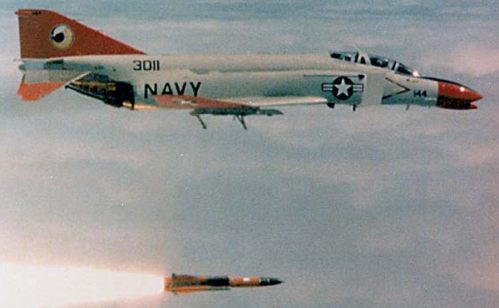AlmightyTallest
Posts: 279
Joined: 2/25/2014
Status: offline

|
Came across this after speaking with some guys about the test ranges used for CIWS systems.

http://www.designation-systems.net/dusrm/app4/ma-31.html
The above is the MA-31 target drone purchased by the U.S. from Russia in the mid 90's. It's actually a Kh-31 fitted with telemetry and other systems from Boeing for controlled range tests to serve as a supersonic anti-ship missile threat test vehicle.
The interesting tidbit...
quote:
However, the MA-31 was only an interim solution, because the drone lacked the range and flight path accuracy to fully satisfy the Navy's SSST (Supersonic Sea-Skimming Target) requirement for the simulation of a high-speed anti-ship missile. During the MA-31 evaluation, Boeing had demonstrated an improved variant (sometimes called MA-31PG; PG = "Precision Guidance") with a GPS-based navigation system and the resulting option for a precise flight path after a high-altitude (and therefore longer range) launch, but in the end this variant was not selected for production as the ultimate SSST. Instead, that contract went to Orbital Sciences in June 2000, leading to the GQM-163 Coyote SSST. After the GQM-163 became operational, the remaining MA-31 targets were expended until the end of 2007 and the program terminated.
From Wiki:
http://en.wikipedia.org/wiki/Kh-31
quote:
MA-31 - telemetry and other systems installed by McDonnell Douglas/Boeing for use by the US Navy as a target drone. Tested between 1996-2007;[13] a version upgraded with GPS, the MA-31PG, was offered to the Navy as a replacement for the MQM-8 Vandal but they bought the GQM-163 Coyote. Even with the additional equipment, the MA-31 was capable of Mach 2.7 and 15G maneuvers in its anti-ship (sea-skimming) flight profile and Mach 3.5 in ARM mode at 48,000 ft (15,000 m).
I'm surprised with the figures given above, 15 G maneuver at mach 2.7 sea skimming it didn't meet the Navy's requirement for the Supersonic Sea-Skimming Target.
http://www.defenseindustrydaily.com/gqm163-ssst-a-tricky-coyote-to-match-wits-with-defenses-03155/
quote:
The Coyote target missile design integrates a 4-inlet, solid-fuel ducted-rocket ramjet propulsion system into a compact missile airframe 18 feet long and 14 inches in diameter.
The small 14" diameter width of this missile would make it a harder RCS target
quote:
The sustainer propulsion system consists of an Atlantic Research Corporation (now Aerojet) MARC-R-282 solid-fueled ducted rocket/ramjet engine, which can propel the Coyote to speeds of up to Mach 2.8 at sea level. In the terminal approach phase, the GQM-163A will fly at Mach 2.5 at 5 m (16 ft) altitude.
They certainly seem to be trying to simulate the SS-N-27 in these tests.
Meanwhile, in other CIWS news:
Looks like the Goalkeeper is taking a cue from the Phalanx upgrades to keep up with the new threats.
http://www.naval-technology.com/news/newsthales-upgrade-goalkeeper-weapon-system-dutch-navy

quote:
he Netherlands Ministry of Defence (MoD) has awarded a contract to Thales Nederland to upgrade its Goalkeeper close-in weapon systems (CIWS), which are currently in use with the country's navy.
Under the contract, the company will modernise 16 Goalkeeper systems and resolve a number of obsolescence issues to provide the navy with the ability to deal with existing and emerging threats.
New algorithms and electro-optic tracking capabilities will be used to enhance prediction and improve multi-goalkeeper deployment capabilities of the system, as well as enabling them to destroy modern missiles.
Developed in the 1980s, the updates are expected to enable the system to remain operationally deployed until 2025.
I thought there was only one version of Goalkeeper, but to get one with E/O and the algorithm upgrades something akin to what the Phalanx recieved was a surprise.
< Message edited by AlmightyTallest -- 6/25/2014 3:31:02 PM >
|
 Printable Version
Printable Version









 New Messages
New Messages No New Messages
No New Messages Hot Topic w/ New Messages
Hot Topic w/ New Messages Hot Topic w/o New Messages
Hot Topic w/o New Messages Locked w/ New Messages
Locked w/ New Messages Locked w/o New Messages
Locked w/o New Messages Post New Thread
Post New Thread